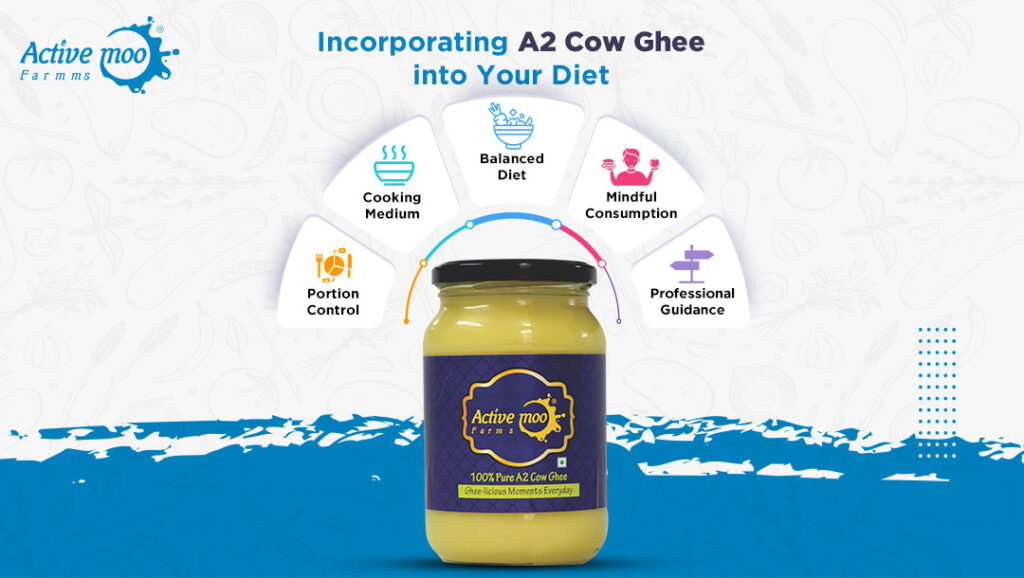In the pursuit of weight management and achieving our fitness goals, diet plays a pivotal role. While it may seem counterintuitive to include fats in our diet, it’s important to understand that not all fats are created equal. A2 cow ghee, a traditional and nutrient-rich source of fat, has been gaining recognition for its potential benefits in weight management. If you’re looking for a natural and wholesome addition to your diet that can fuel your fitness goals, A2 cow ghee might just be the ingredient you’ve been searching for.
Derived from the milk of cows that produce the A2 protein, A2 cow ghee stands apart from regular ghee made from the milk of cows producing the A1 protein. It is believed to be easier to digest, possess a healthier fat profile, and be abundant in essential nutrients. In this blog, we will delve into the potential benefits of A2 cow ghee for weight management, shedding light on why it could be an advantageous ally in your journey towards a fitter and healthier you.
Understanding A2 Cow Ghee:
To fully appreciate the potential benefits of A2 cow ghee for weight management, it’s important to understand what sets it apart from regular ghee.
Ghee, a clarified butter made from cow’s milk, has been used in traditional Indian cooking for centuries. However, A2 cow ghee specifically comes from cows that produce milk containing the A2 protein, as opposed to the A1 protein found in milk from some modern breeds of cows.
The A2 protein is believed to be easier to digest for many individuals. Some studies suggest that A1 protein can lead to digestive discomfort and inflammation in certain people, while A2 protein is considered more tolerable. Therefore, A2 cow ghee may be a suitable option for those with sensitivities or digestive issues.
In addition to its digestive benefits, A2 cow ghee offers a healthier fat profile compared to regular ghee. It contains medium-chain fatty acids (MCFAs) and omega-3 fatty acids, which are considered healthy fats. These fats can provide sustained energy, aid in satiety, and potentially contribute to weight management.
How A2 Cow Ghee Supports Weight Management:
A2 cow ghee can play a beneficial role in weight management due to its unique composition and potential impact on the body. Here are some ways in which A2 cow ghee supports your weight management efforts:
Healthy Fat Source: Contrary to popular belief, not all fats are detrimental to weight management. A2 cow ghee contains healthy fats, including medium-chain fatty acids (MCFAs) and omega-3 fatty acids. These fats are known to provide a slow and sustained release of energy, which can help keep you feeling fuller for longer periods. By promoting satiety, A2 cow ghee may reduce the chances of overeating or snacking between meals.
Boosts Metabolism:
The medium-chain triglycerides (MCTs) present in A2 cow ghee can potentially boost your metabolism. MCTs are rapidly absorbed and quickly converted into energy by the liver, rather than being stored as fat. This increased metabolic rate can aid in burning calories more efficiently and contribute to weight loss or weight maintenance.
Supports Digestion:
A2 cow ghee contains butyric acid, a short-chain fatty acid with anti-inflammatory properties. Butyric acid is known to support a healthy digestive system by nourishing the cells lining the gut, promoting gut integrity, and reducing inflammation. A healthy gut is crucial for optimal digestion, nutrient absorption, and maintaining a balanced metabolism, which are all important factors in weight management.
Nutrient Density:
A2 cow ghee is not only a source of healthy fats but also contains essential vitamins such as vitamin A, E, and K2. These vitamins play various roles in the body, including supporting overall health, immune function, and bone health. When you incorporate A2 cow ghee into your diet, you’re not just adding empty calories but also providing your body with essential nutrients that contribute to overall well-being.
It’s important to note that while A2 cow ghee offers potential benefits for weight management, it should still be consumed in moderation. Like any fat, it is calorie-dense, so portion control is key. Incorporating A2 cow ghee into a balanced diet, along with regular physical activity, can help optimise your weight management efforts.
Remember, everyone’s dietary needs and responses may vary. If you have specific dietary concerns or conditions, it’s always advisable to consult a healthcare professional or registered dietitian before making significant changes to your diet. They can provide personalised guidance and ensure that A2 cow ghee aligns with your individual weight management goals.
Incorporating A2 Cow Ghee into Your Diet
When it comes to including A2 cow ghee in your diet for weight management and fueling your fitness goals, it’s important to do so in a mindful and balanced manner. Here are some tips to help you incorporate A2 cow ghee effectively:
Portion Control:
While A2 cow ghee offers potential benefits, it’s important to remember that it is still fat and high in calories. To avoid excessive calorie intake, practice portion control. Start with small amounts, such as one or two teaspoons per day, and adjust based on your individual needs and goals.
Cooking Medium:
A2 cow ghee has a high smoke point, which means it can withstand high temperatures without breaking down and forming harmful compounds. This makes it an excellent choice for cooking and sautéing. Use it as a substitute for other cooking oils or butter in your favorite recipes to add flavor and richness to your dishes.
Balanced Diet:
Incorporating A2 cow ghee into a balanced and diverse diet is key. It should not be the sole focus of your dietary changes. Ensure that you are consuming a variety of whole foods, including fruits, vegetables, lean proteins, whole grains, and other healthy fats. A balanced diet provides essential nutrients and supports overall health and weight management.
Mindful Consumption:
Practice mindful eating when using A2 cow ghee. Be aware of the flavors and textures it adds to your meals, and savor each bite. Mindful eating encourages you to listen to your body’s hunger and fullness cues, preventing overeating and promoting a healthier relationship with food.
Professional Guidance:
If you have specific dietary concerns, existing health conditions, or are unsure about how to incorporate A2 cow ghee into your diet, it is always recommended to consult with a healthcare professional or registered dietitian. They can provide personalized advice and guidance based on your individual needs, goals, and overall health status.
Remember that while A2 cow ghee may have potential benefits for weight management, it is not a magic solution. It should be part of a holistic approach that includes regular physical activity, portion control, a balanced diet, and overall lifestyle choices.
Also Read: A2 Vedic Ghee for Keto Diet: Why it’s a Popular Choice for Keto Followers

Takeaway
In the pursuit of weight management and achieving our fitness goals, A2 cow ghee can be a valuable ally. With its unique composition and potential benefits, it offers a wholesome and nutrient-rich addition to your diet. By incorporating A2 cow ghee mindfully and in moderation, you can fuel your fitness goals effectively.
A2 cow ghee provides a source of healthy fats, such as medium-chain fatty acids (MCFAs) and omega-3 fatty acids, which can support satiety, sustained energy, and potentially aid in weight management. Additionally, its content of butyric acid promotes a healthy digestive system and may contribute to improved nutrient absorption and metabolism.
When incorporating A2 cow ghee into your diet, it’s essential to practice portion control and moderation. Being mindful of your consumption and combining it with a balanced and diverse diet rich in whole foods will ensure that you reap its benefits without overdoing it.
You can reap these health benefits by including organic A2 cow ghee in your diet. In Indore, you can purchase A2 cow ghee online from our website or Amazon.
Remember, A2 cow ghee is not a magic solution for weight management. It should be part of an overall healthy lifestyle that includes regular physical activity and mindful eating. Each individual’s dietary needs and responses may vary, so it’s advisable to consult with a healthcare professional or registered dietitian to ensure it aligns with your specific goals and requirements.




